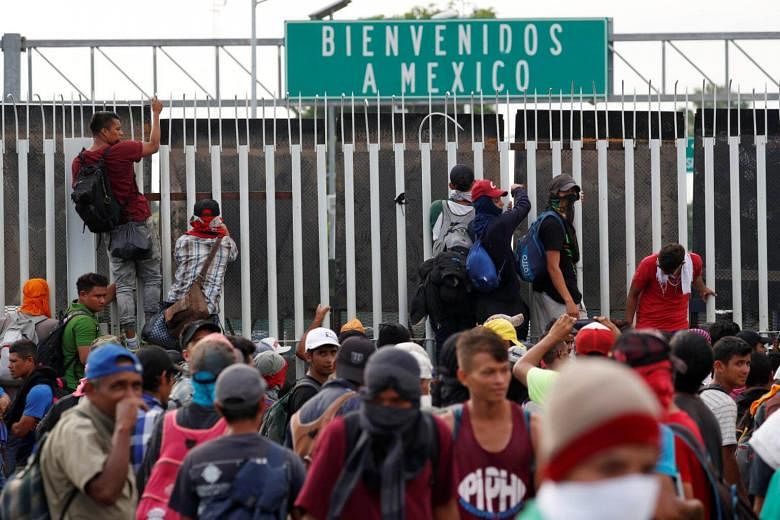SAN SALVADOR (WASHINGTON POST) - A caravan of an estimated 200 migrants departed El Salvador on Sunday (Oct 28) en route to the United States, sparked by a similar group from Honduras that is making its way through Mexico.
Migrants say they are fleeing violence, corruption and unemployment. Many see the caravan as their best chance of migrating safely to the US, given the dangers of crossing Mexico.
"Life isn't good here," said 13-year-old Anderson Medina Abrego. "They are killing a lot of people. I live in Barrio 18 gang territory, so I can't even go to another area because they say they will kill me."
His mother, Ms Edita Abrego Lira, 54, echoed his concerns. "If I send them to the store, I'm going to worry if they don't come back soon," she said.
Although recent caravans of Central Americans have drawn heightened attention from US politicians, migrating is a daily reality for many Salvadorans.
More than 50,000 migrants from the country were apprehended when trying to cross into the US in 2017, according to the US Customs and Border Patrol.
"El Salvador experiences a migration dynamic where 200 to 300 people migrate each day," said Mr Cesar Rios, director of the Salvadoran Institute for Migration, a non-governmental organisation based in San Salvador. "A caravan is the visibility of this hidden reality."
Salvadoran migrants see strength and protection in numbers. "We've thought about going before, but now we finally have the opportunity," said 18-year-old Dalila Abigail Landaverde, who is travelling with her partner and their three-year-old daughter, Tatiana.
Ms Landaverde said the family has received threats since her mother was killed in 2014.
"In a caravan, you are united. If something happens to you, someone will help you," said Ms Jessica Yamileth Zabaleta Guzman, 24, who is travelling with her partner and their one-year-old son.
Upon hearing rumours of the caravan, the Salvadoran Ministry of Justice and Security dispatched police to patrol the perimeter of the plaza where migrants gathered on Sunday morning, many with small backpacks and some with no belongings at all.
The measures were to ensure the safe passage of the migrants rather than hinder their journey, according to a ministry spokesman.
In a statement, Minister of Justice and Public Security Mauricio Landaverde emphasised that "mobility is a reality and a right".
In Washington, President Donald Trump has threatened to cut off or substantially reduce US aid to countries that do not stop the migrants. Last week, The Washington Post reported that Mr Trump was considering a plan to use emergency powers to shut the US border to Central American migrants.
Salvadoran President Salvador Sánchez Cerén has rejected Mr Trump's demands to prevent migrants from leaving.
"For us, migrating is a right, and so migrants' rights have to be respected," Mr Cerén said at a news conference in Cuba last Wednesday (Oct 24).
Another Honduran caravan of an estimated 1,000 migrants clashed with Mexican authorities at the Guatemala-Mexico border on Sunday. A second Salvadoran caravan is expected to leave on Wednesday, with an estimated 500 participants.
A caravan of migrants that left the Honduran city San Pedro Sula on Oct 13 has gained the attention of Mr Trump and other Republican politicians who have questioned the timing of the caravan just weeks before US midterm elections on Nov 6.
The Trump administration has blamed the Venezuelan government, billionaire George Soros and House Democrats for organising the caravan. There is no evidence to support those claims.
Some of the Salvadoran migrants said they were unaware of the midterm elections and the political implications of the timing of their journey.
"Donald Trump doesn't like us Latinos, but we are still going to go," said Mr Luis Antonio Lopez, 32, who is going to the US to look for work.
Central Americans have been migrating to the US in large numbers since at least the 1980s, when countries experienced deadly civil wars and US intervention in the region fuelled massive human rights abuses.
In recent years, Salvadorans have migrated north, fleeing violence, extreme poverty and corruption.
Despite decreasing rates of violence, the country still has one of the highest rates of homicides in the world, with nearly 4,000 murders in 2017 in a country roughly the size of Massachusetts.

